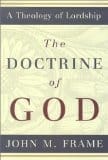Frame: God’s Eternal Plan Takes Creaturely Integrity Into Account


From John Frame in The Doctrine of God:
The human life you live has its own significance, surely granted by God, but different from God’s own significance and in that sense dependent on it…Once God formulates his plan and creates the world, created individuals have stable, historical roles that are distinct from God himself and even opposed to him. And once God grants those roles to creatures, he will not take them away, for to do so would violate his own plan.
Does God, then, limit his sovereignty? Yes and no. No, because this creaturely integrity is part of God’s decree. At no point does God relinquish control over his world.
But I stress again that God’s decree is not irrational or inconsistent with himself. In that sense, Reformed theologians have always said, God can not simply do anything. He cannot do something that contradicts his nature. And he cannot include one thing in his plan that contradicts another. In that sense, God is limited by the consistency of his own plan.
And that limitation has something to do with the nature of creaturely otherness. For God to be consistent with himself, he must be consistent with Bill. God knows that, according to his plan, Bill will die at eighty. This is a fact about God’s plan; it is also a fact that God foreknows about Bill. All other things that God ordains about Bill must be consistent with this reality.
[Note: I’m pretty sure he’s not talking about Bill Kinnon here.]
We can picture God planning the universe as a man puts together a jigsaw puzzle. The individual pieces must fit with one another and with the whole. The shape of one piece determines what piece may fit next to it…
God does not limit his sovereignty. but his eternal plan does take creaturely integrity into account. God does not want to make creatures who have no integrity. Thus, he makes beings who are fitted to carry out their distinctive purposes, and the other elements in his plan respect those purposes.
Frame argues that Arminians are right to argue for creaturely otherness and integrity. However, he argues that God’s power controls us in a way that is perfectly consistent with who we are.
To feel responsible is to affirm for ourselves the purpose for which God has made us. To feel significant is to recognize that God has given each of us an important role in history, and that he has arranged everything else in the universe to be consistent with that role.






